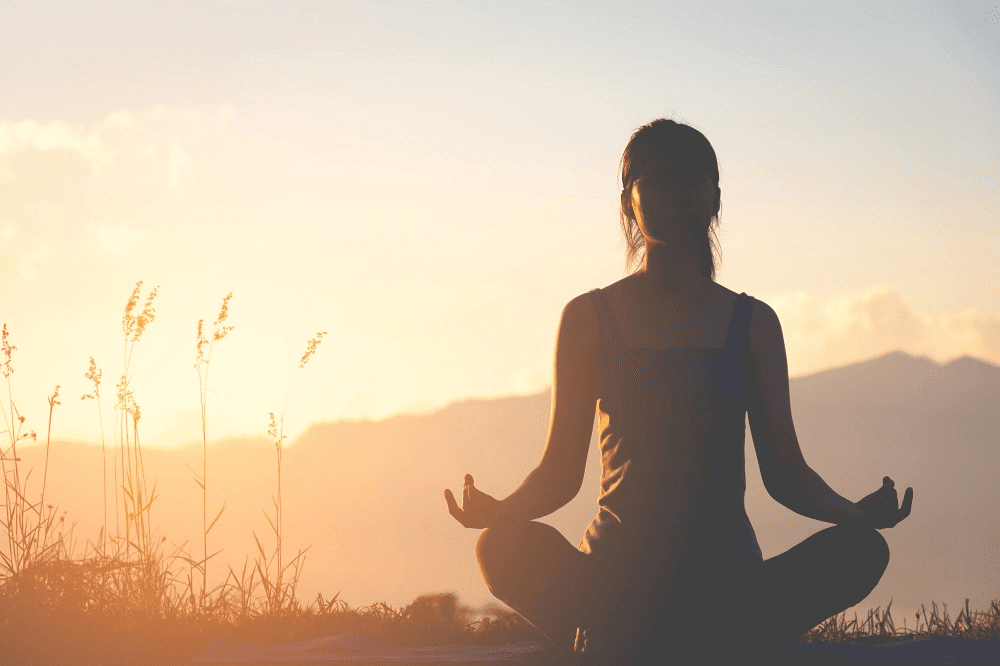Do you have trouble sleeping at night? Are you constantly waking up anxious and stressed out? If so, you may be wondering if there is anything you can do to help. It’s no secret that anxiety and insomnia often go hand in hand. Millions of people around the world struggle to get the sleep they need because their minds are constantly racing with worry and fear. And while there are many different medications available to treat these conditions, they can often be expensive and have undesirable side effects. That’s where meditation comes in. Meditation is a great way to relax your mind and body and can be helpful for people who have trouble sleeping. This post will examine some of the best meditation techniques for sleep and anxiety.
We’ll also provide some tips on how to get started with meditation. So if you’re looking for a way to improve your sleep and overall well-being, read on!
What is Meditation?
Meditation is an ancient practice that has been used for centuries to promote relaxation and peace of mind. There are many different types of meditation, but all of them aim to focus and quiet the mind. This can be done by focusing on your breath, a mantra, an affirmation, or an object. When you meditate, you will often find that your thoughts will wander. This is normal! The key is to notice when your mind has wandered and then gently bring your focus back to your breath or the object of your meditation. With time and practice, you can train your mind to stay focused for extended periods.
Why is Meditation Good for Sleep?
There are many reasons why meditation can be helpful for people who have trouble sleeping. For one, it can help to quiet the mind and reduce racing thoughts. This is important because when we are trying to sleep, we need to relax our minds to drift off into a restful slumber. In addition, meditation can also help to reduce stress and anxiety. And since stress is a significant trigger for insomnia, this can be a helpful way to break the cycle of sleepless nights.
What are the Best Meditation Techniques for Sleep?
Many different meditation techniques can be used to promote sleep. Here are some of the most popular include:
1. Guided meditation

Guided meditation is a form of meditation that is often recommended for people who are new to the practice. You are led through a guided meditation by a voice or a recording. This can be helpful because it can provide guidance and support and helps to keep your mind focused. There are many different guided meditations available online, and you can find ones that are tailored to specific needs, such as relaxation, stress relief, or sleep.
If you are looking for a way to relax your body and mind before bed, here are 5 simple guided meditations that can help:
1. The Body Scan Meditation: This meditation is designed to relax the entire body. You will start by focusing on your breath and then slowly work your way down your body, relaxing each muscle as you go.
2. The Mindfulness of Dreams Meditation: This meditation helps you to become aware of your dreams and to learn from them. You will focus on the images and sensations in your dreams and how they can help you understand yourself better.
3. The Relaxing Breath Meditation: This meditation takes just 5 minutes and is perfect for beginners. It helps to calm the mind and release stress and tension.
4. The Loving-Kindness Meditation: This meditation promotes feelings or emotions of love and kindness towards yourself and others. It can help to decrease stress and anxiety and promote a sense of peace and well-being.
5. The Gratitude Meditation: This meditation focuses on the things we are grateful for in life. It helps to shift our focus away from negative thoughts and emotions and towards the positive aspects of life.
Here are a few tips when you are trying out guided meditation:
- Choose a calm and relaxing environment where you will not be disturbed.
- Make sure you have enough time to relax and focus on the meditation.
- Get comfortable and close your eyes.
- Listen to the guidance and allow your mind to focus on the instructions.
- Do not worry if your mind wanders – bring your focus back to the mediation when this happens.
2. Mindfulness meditation

Mindfulness meditation is a popular form of meditation that involves focusing on the present moment. When you practice mindfulness meditation, you focus on the sensations of breath and body and pay attention to any thoughts or feelings that come up. This type of meditation can be helpful for people who have trouble staying focused or who tend to have racing thoughts at night. Mindfulness meditation can help to reduce stress and anxiety and promote a sense of peace and well-being. It is often recommended for people new to meditation, as it is a relatively easy technique to learn.
To practice mindfulness meditation, find a quiet spot where you can sit or recline in comfort. Please close your eyes and focus on your breath, taking note of the air entering and leaving your body. When your mind wanders, bring your focus back to your breath.
Mindfulness meditation can be practiced for any length, but 5-10 minutes is generally recommended for beginners. You can increase the duration as you become more comfortable with the practice.
3. Transcendental meditation

Transcendental meditation (TM) is a form of meditation that was created by Maharishi Mahesh Yogi. TM is one of the most popular forms of meditation and is often recommended for people who are looking for more intense practice. During TM, you focus on a mantra (a word or phrase that is repeated over and over) to help you achieve a state of deep relaxation.
This type of meditation can be helpful for people who have trouble calming their minds, as it allows them to focus on a specific object or thought. Transcendental meditation has been shown to reduce stress and anxiety and promote a sense of well-being. It is also said to improve sleep quality and quantity.
To practice transcendental meditation, you will need to find a certified TM instructor. The instructor will teach you the technique and provide you with a mantra. You will then be required to practice TM for 20 minutes twice daily.
TM can be a difficult practice to learn, but it can be very beneficial for those who are able to stick with it. The benefits of TM include reduced stress and anxiety, improved mental clarity, and enhanced creativity.
4. Visualization meditation

Visualization meditation is a type of meditation. This involves picturing a calming scene or object in your mind’s eye and focusing on the details of that image. When you practice visualization meditation, you may find that your mind begins to relax and become more focused. This type of meditation can be helpful for people who have trouble sleeping or who experience anxiety at night.
To practice visualization meditation:
- Find a quiet spot where you can sit or recline in comfort.
- Close your eyes and focus on the image you would like to visualize.
- When your mind wanders, bring your focus back to the image. This meditation can be practiced for as long as you like, but it is best to start with just a few minutes each day.
If you’re new to visualization meditation, it may be helpful to find an image to focus on that is particularly calming or soothing to you. This could be a natural scene, a memory of a happy time, or anything else that brings you peace. Once you’re comfortable with the practice, you can experiment with different images to see what works best for you.
5. Zen meditation

Zen meditation is one of the best types of meditation for sleep and anxiety. It is a type of mindfulness meditation that involves focusing on your breath and counting each inhales and exhale. This helps to clear your mind and focus on the present moment.
Here are some tips on how to get started with Zen meditation:
- Sit in a relaxable position with your spine straight. You can sit in a chair or on the floor with your legs crossed.
- Close your eyes and focus on your deep breath. Inhale through your nose and count to 5, then exhale through your mouth and count to 5. Repeat this for several rounds.
- If your mind begins to wander, gently bring your attention back to your breath.
- Practice Zen meditation for 10-15 minutes per day, gradually increasing the time as you get more comfortable with it.
Zen meditation is a simple but effective practice that can be helpful for people who are looking for ways to reduce stress and anxiety. It is also said to improve sleep quality and quantity.
What are the Benefits of meditation for sleep and anxiety?
When it comes to relaxation and reducing stress, there are many benefits of meditation. In fact, meditation can be an extremely effective tool for managing anxiety and improving sleep quality.
Sleep is essential for our overall health and well-being, yet many of us struggle to get a good night’s rest. According to the National Sleep Foundation, more than 60 million Americans yearly suffer from insomnia.
Anxiety is another common issue that can impact our sleep. Anxiety disorders are the most common mental disease in the United States, affecting 40 million adults aged 18 and older.
While there are many different approaches to managing anxiety and improving sleep, meditation is a natural, drug-free option that can be highly effective.
So how exactly does meditation help with sleep and anxiety?
Here are three ways:
- Meditation quiets the mind and helps break the anxiety and stress cycle.
- Meditation promotes deep relaxation, which can help improve sleep quality.
- Meditation can help to redirect racing thoughts and worries that can keep us awake at night.
If you’re struggling with anxiety or sleep issues, try meditation. It’s a simple, drug-free way to promote relaxation and stress relief.
Conclusion:
All of the types of meditation that we’ve discussed can be helpful for people who are looking to reduce stress and anxiety. If you’re not sure which type of meditation is best for you, it may be helpful to try out a few different methods until you find one that works best for you. The benefits of meditation include reduced stress and anxiety, improved mental clarity, and enhanced creativity. So why not give it a try? You may be surprised at how much peace mediation can bring to your life.



